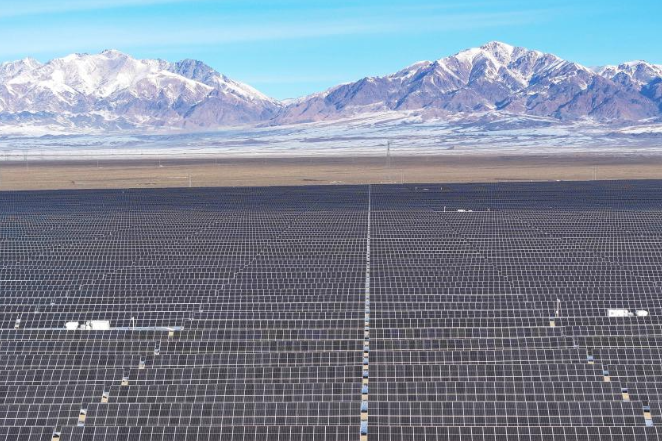New unity needed amid challenges of new global age

Globalization is not ending but is decisively changing its form. The great tectonic plates that undergird our world - technological, geopolitical, and environmental - are shifting dramatically, causing political and social earthquakes around the world.

Many governments can't cope; many institutions are cracking. Throughout the world, we will have to scramble to reshape our institutions for a dramatically changed global landscape.
Deep upheavals of globalization are not new, but are always tumultuous. The great upheavals of past globalizations - I count our new era as the seventh age of globalization - have been paced by changes in technology, institutions, and nature.
The end of the last ice age and the birth of agriculture gave rise to a new global age; the printing press and Columbus' voyages of discovery to another; and the inventions of the steam engine coupled with global capitalism to yet another. With these discoveries came new forms of politics, economics and global competition, and, all too often, conflict.
Ours is the new digital age, which began in the 1930s when the great British genius Alan Turing envisioned the possibility of universal computation based on sequences of 0's and 1's, and when he and polymath John von Neumann began to put that vision into operation during World War II. The computer, the postwar transistor, then integrated circuits, fiber optics and Moore's law, the observation that the number of transistors in a dense integrated circuit doubles about every two years, all helped to turn Turing's vision into a new digital age.
This technological revolution is now disrupting every aspect of economic and social life. We are in the new world of e-everything: commerce, education, governance, production, healthcare and culture. COVID-19 is the world's first e-epidemic. We work online from home, track the virus's path on mobile apps, and scour the world's social media for tips on how to stay alive.
The digital revolution is the key to understanding the geopolitical revolution as well, the one that has brought China to the front ranks of global power, diminished the United States in relative terms as digital technologies have spread worldwide, and opened the world of social media, fake news, and electronic tribalism and e-terror brilliantly predicted a half-century ago by futurist and philosopher Marshall McLuhan.
The American Century is now over and gone, in ashes as the US cities are again aflame in protest at persistent racism, vast inequalities and shocking failures of governance, especially of the US administration. While America no longer occupies the global center stage, no single country or region or alliance will replace it.
Like it or not, and many do not, we truly live in McLuhan's global village. If the new century "belongs "to anyone, it is to the new technologies and to the tech giants.
The digital age has already fundamentally reshaped the world economy, and thereby the physical environment, through the birth of global supply chains, global logistics, mass travel and trade, and worldwide industrialization and agriculture.
Global economic growth has also brought about mass deforestation, the mass destruction of land and marine habitats, the collapse of biodiversity, and the massive emission of greenhouse gases that are destabilizing the global climate. It has pushed humanity into new ecological niches wherein humans and animals exchange novel viruses, giving rise to new emerging infectious diseases such as the COVID-19 virus that is ravaging societies everywhere.
But COVID-19 is just the latest of many such zoonotic diseases, including SARS, MERS and Ebola. There will be others, too.
It is not surprising, therefore, that our current upheavals have hit a world that lacks a leader to face them. The age of US leadership has passed, but the need for global cooperation has only increased. US President Donald Trump's calls for America First are naive, reactionary and confused at a time when global challenges require global-scale solutions.
China rightly favors international cooperation but needs to convince many worried nations that its vast powers and technological might will be put to use for the global good. Europe is divided in its politics, but is mostly united in the view that the world will need a stronger global system to address the current upheavals.
The transitions from one global age to the next have typically been periods of geopolitical competition and conflict. Nations scramble to harness the new technologies for wealth, power and glory.
Yet brazen competition today, in a thermonuclear age beset by pandemic diseases, environmental devastation and the fragilities of global supply chains and infrastructure vulnerable to collapse and attack, could end us all. Only a shared vision, not a new scramble for power in the current disarray, can underpin peace and survival.
The new age of globalization should therefore not forsake the great accomplishments of the preceding age, including the US-led creation of the United Nations. The UN Charter is still a sound basis for global security, albeit one that must be updated to move beyond the special privileges accorded to the five "permanent powers" of the UN Security Council.
The UN's Universal Declaration of Human Rights is still the world's moral charter, and one that is the product of many cultures, as it combines Western enlightenment values with Confucian wisdom and Islamic insights. It still stands today as a great beacon of hope and shared global values.
Yet the great UN innovations of the 1940s are no longer sufficient 75 years on. Our new global age needs to build a new unity of nations for the 21st century, ready to rebuild from the current COVID-19 crisis on the basis of social justice and environmental sustainability.
The most important concept will surely be global solidarity, or as the UN puts it, "leaving no one behind".With pandemic diseases, global climate change and the ongoing degradation of the world's ecosystems, no region will be safe unless all are safe.
Even through the flames today engulfing America's cities, we can discern a new path for a new age. By looking back to history we can look forward. Globalization will not go away, but it can and must be better managed.
There will be no solution that rejects technology, only solutions that harness technology for the common good. Economy and politics are not separate spheres, but are inevitably joined together, for better or for ill.
The two faces of politics - as a naked struggle for power or as a quest for the common good - have always been with us. Well-being can be secured only when we choose politics and economics for the common good, which is the most important lesson for our time.
The author is an economics professor and director of the Center for Sustainable Development at Columbia University and author of The Ages of Globalization. The views do not necessarily reflect those of China Daily.

































